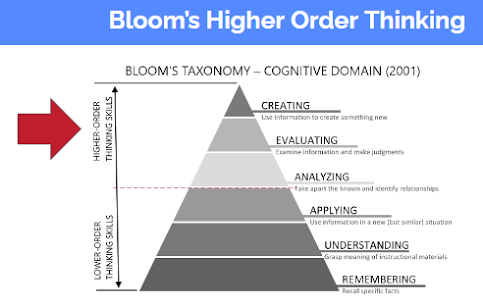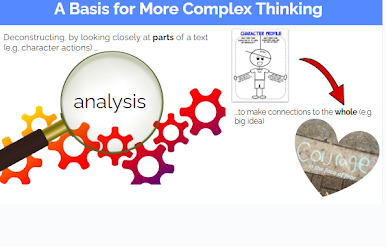“ Students who are competent thinkers and problem-solvers. … reflect on their own learning, draw on personal knowledge and intuitions, ask questions, and challenge the basis of assumptions and perceptions.” (New Zealand Curriculum p. 12).
Today, Dorothy (Manaiakalani) led a discussion on the framework for 21st-century learning and innovation, emphasising the 4 Cs as essential skills across different learning areas. Critical thinking is especially crucial for our young students in navigating life in the 21st century. With this in mind, we dived into a day all about how to teach our learners to think critically!
Dorothy’s thoughts about our students’ online presence were particularly insightful and valuable. Our learners make choices that put them into vulnerable positions online, so it was great to hear how the critical thinking aspects of Maniakalani’s pedagogy can help students navigate the digital world wisely. Teaching critical thinking in all years is more crucial now than ever before.
My top tip from Dorothy’s today (there are always many) is about trying Adobe Express podcasting to incorporate more text-to-voice technology opportunities for my students. It will continue to develop their oral language skills in a rewindable way.
Higher Order Thinking to Access Deeper Meaning
Next, we dived into different frameworks that help organise our student's thoughts that show a progression from simpler to more complex thinking. Higher-order thinking, which is more complex, requires more brain power and needs to be scaffolded. This is very clear when using Bloom's Taxonomy, something I used a lot in my early teaching career and a framework worth thinking about again when planning meaningful learning activities.

I found it valuable to revisit the progression from literal to higher-order thinking skills. It allowed me to reflect on the distinctions between interpretive and evaluative questions. I sometimes struggle to differentiate between the two and being reminded that evaluative questions often involve an element of interpretation, will help when using these questions in response to text activities.
- At the literal level (‘reading on the lines’) information is stated directly and can be located at one or more places.
- At an interpretive level (‘reading between the lines’) readers have to use their reasoning and critical analysis skills to work out an implied or suggested meaning (not directly stated).
- At the evaluative level (‘reading beyond the lines’) readers are making judgements concerning values, correctness or issues of wider social significance (and relating these to their own contexts and lives).
One key idea that I noticed was that students need to be able to evaluate as they read so they can understand how they have come to think in a certain way. We should always aim to empower learners to go beyond the surface meanings, and not to take those meanings for granted (or as a given).

Critical Analysis to Read Critically
I enjoyed the sessions on how powerful it can be for our learners to look at a text from different perspectives or positions and to reflect on how well I am doing this in my class. To think like this my learners need to be able to critical analysis to solve the problem by evaluating or making judgments based on the text.
Provocations, dilemmas, or perspectives can spark higher-order thinking but can be hard to understand. I need to make sure I plan in more opportunities for learners to revisit and talk about the text. This will help students remember and use evidence or vocabulary from the text to back up their views.
The vocabulary activities I have implemented from previous RIP days are helping shift new vocabulary from being just understood to being actively used. Finding ways to keep encouraging them to talk freely about the text is key. A next step for my teaching practice.
Lastly, we looked at analysing figurative language and how this helps readers extend their thinking skills through analysis and interpretation of language features. This included looking at different activities for students to respond to a text with an evaluative lens. We have been tasked with creating a few activities for our students to try over the next few weeks and I am looking forward to getting stuck in.







